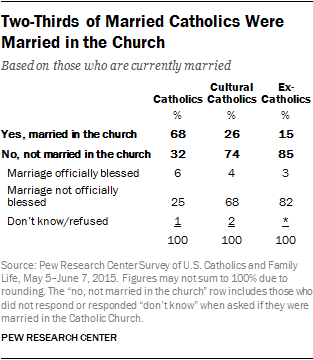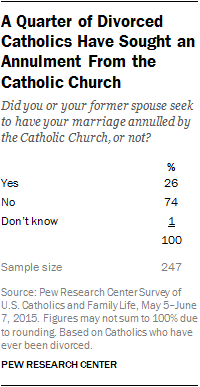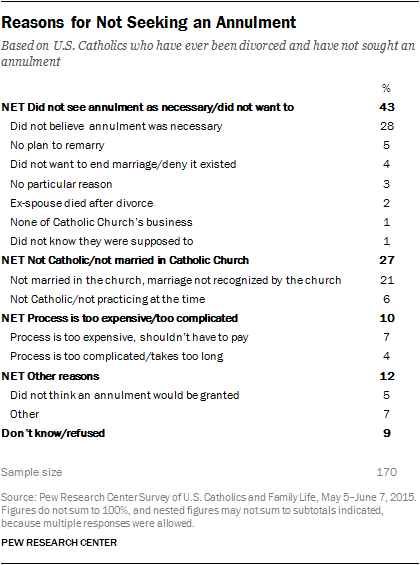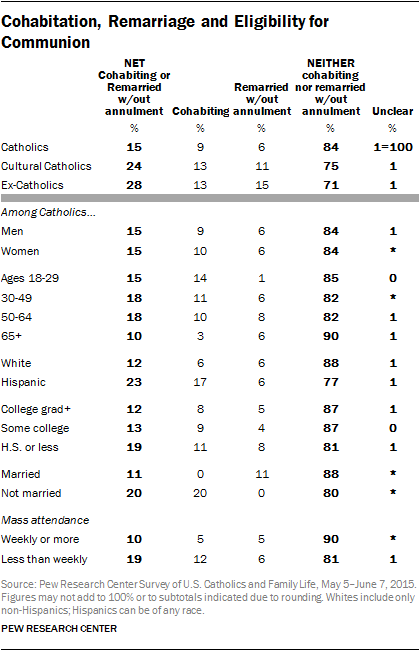Pope Francis’ upcoming visit to the United States will include his participation in the triennial World Meeting of Families in Philadelphia. This year’s meeting is expected to generate discussion on how the Catholic Church responds to new trends in marriage and family arrangements. Previous polling and analysis on the composition and structure of families has shown a marked shift away from the so-called traditional dynamic of a married man and woman raising children. Adults are waiting longer to get married, and some are forgoing marriage while living with their romantic partners and raising children. Additionally, a growing number of adults have remarried, and acceptance of same-sex couples has greatly increased.
Many U.S. Catholics have experiences with divorce and remarriage, as well as cohabitation. And as a whole, Catholics are accepting of various kinds of family arrangements, including cohabitation and same-sex relationships.
This chapter looks at Catholics’ views on marriage, divorce and family life.
Marriage, Divorce and Cohabitation

Two-thirds of Catholics (68%) who are currently married were wed in the Catholic Church, and an additional 6% later had their marriages blessed by the church. By contrast, much smaller shares of cultural Catholics and ex-Catholics who currently are married say their weddings took place in the church or that their marriages were later recognized by the church.
Fully 86% of married Catholics who attend Mass on a weekly basis report that their marriages are recognized by the Catholic Church, compared with 65% of married Catholics who attend Mass less often.

A quarter of Catholic adults have experienced a divorce, including 9% who are currently remarried. Somewhat larger shares of cultural Catholics (32%) and ex-Catholics (31%) have been divorced, and among these groups, remarriage is more common than among Catholics.

Among Catholics who have ever been married, roughly one-third (34%) have experienced a divorce. This is lower than among other major religious groups in the U.S. For example, nearly half of religiously unaffiliated Americans who have ever been married also have been divorced (49%), as have 55% of black Protestants and 45% of both white evangelical Protestants and white mainline Protestants.
Catholics who report attending Mass on a weekly basis are less likely than those who attend less often to have experienced a divorce. Among Catholics who attend Mass weekly and who have ever been married, 28% have been divorced, compared with 38% who report attending Mass less often.

Among Catholics who have gone through a divorce, about a quarter (26%) say they or their former spouse sought to have their marriage annulled by the church. Three-quarters did not seek an annulment, and they give a variety of reasons for not having done so.
About four-in-ten (43%) divorced Catholics who did not seek an annulment say they did not see an annulment as necessary or did not want to annul their marriage. This includes some who say they have no plans to remarry (5%) and others who prefer not to invalidate the marriage they had (4%).
Nearly three-in-ten (27%) divorced Catholics who did not seek an annulment say they or their spouse were not Catholic at the time of their marriage or the time of their divorce, or they had not been married in the church. An additional 10% say the process is too expensive or too complicated, and 5% say they did not think the annulment would be granted.


Despite the church’s censure of cohabitation outside of marriage, 44% of Catholics say they have at one time lived with a romantic partner, including about one-in-ten who currently live with a partner (9%).

The decision to live with a partner before marriage, or as an alternative to marriage, is even more widespread among cultural Catholics and ex-Catholics. About six-in-ten members of both groups say they have, at some point, lived with a partner, and 13% say this is their current living arrangement.
Catholics who report attending Mass on a weekly basis are less likely than those who attend less often to report that they have ever lived with a romantic partner without being married. One-third of Catholics who say they attend Mass weekly report that they have ever cohabited (34%), compared with about half of Catholics who attend Mass less frequently (51%).
The survey’s questions about marital history and current living arrangements can be combined to provide a rough estimate of the share of Catholics who are ineligible to receive Communion, in the eyes of the church, either because they are cohabiting or have gotten remarried without an annulment. Among Catholics, 15% are cohabiting or have gotten remarried without an annulment.11 The figures are even higher among cultural Catholics and ex-Catholics, among whom 24% and 28%, respectively, would currently be ineligible for Communion even if they returned to the church because they are cohabiting or remarried without an annulment.
The data also show that Hispanic Catholics are much more likely than white Catholics to be living with a romantic partner.

Among married Catholics, 11% are ineligible to receive the Eucharist because they have been remarried without an annulment. And one-in-five unmarried Catholics are ineligible to receive the sacrament because they are currently living with a romantic partner.
One-in-five Catholics who attend Mass less than once a week are ineligible for Communion for one of these reasons, including 12% who are cohabiting and 6% who are remarried without an annulment. Among Catholics who say they attend Mass at least once a week, 5% are currently cohabiting and 5% are remarried without an annulment.
Views on Different Lifestyles for Adults

Seven-in-ten Catholics believe a way of life in which a husband and wife choose not to have children is acceptable and as good as any other way of life. This is only slightly smaller than the share of the general public overall that holds this view (76%). An additional 18% of Catholics believe a husband and wife choosing not to have children is acceptable, though not as good as some other ways of life. Only 8% say this family arrangement is not acceptable.
A majority of Catholics also believe it is acceptable for a man and woman in a romantic relationship to live together without being married, including 55% who say this is as good as any other way of life. Most Catholics also say it is acceptable for a same-sex couple in a romantic relationship to live together, including 46% who say this is as good as any other way of life.
Compared with Catholics, similar shares of cultural Catholics and ex-Catholics find cohabitation acceptable. However, cultural Catholics and ex-Catholics are more inclined to say cohabitation is as good as any other way of life, while Catholics are more apt to say this kind of arrangement is acceptable but not as good as some others. Similarly, Catholics, cultural Catholics and ex-Catholics find it generally acceptable for same-sex couples to live together outside of marriage and for husbands and wives to choose not to have children. But Catholics are somewhat less inclined than cultural Catholics or ex-Catholics to say such lifestyles are as good as any other.
The survey also posed these questions to members of other major U.S. religious groups. Black Protestants and white evangelical Protestants are somewhat less likely than Catholics to believe it is acceptable for a man and woman in a romantic relationship to live together without being married. And when asked about couples living together in same-sex relationships, only half of black Protestants say this is acceptable (30% acceptable and as good as any other way of life, 19% acceptable but not as good as some other ways of life). Acceptance of same-sex relationships is lower still among white evangelicals, among whom 21% say such arrangements are as good as any other and 20% say they are acceptable but not as good as some others.
White mainline Protestants and the religiously unaffiliated are more likely than those in other religious groups, including Catholics, to say that these living arrangements are just as good as any other.

Compared with those who do not attend Mass regularly, weekly Mass-attending Catholics are far less accepting of cohabitation (whether between heterosexual or homosexual adults) and the choice not to have children, though majorities – about six-in-ten or more – say each of these arrangements is acceptable at some level.
While majorities of Catholics in all age groups say it is at least somewhat acceptable for a husband and wife to choose not to have children and for a man and a woman to live together outside of marriage, Catholics ages 65 and older are somewhat less accepting of these lifestyles than are younger Catholics. And only about half of Catholics ages 65 and older say it is acceptable for a same-sex couple to cohabit, compared with seven-in-ten or more Catholics in younger age groups.
Hispanic Catholics are somewhat less likely than white, non-Hispanic Catholics to say it is acceptable for a married couple to choose a life without children or for a same-sex couple to live together, though roughly equal shares in each group find it acceptable for a man and a woman to cohabit.

Views on Arrangements for Raising Children

When it comes to various family arrangements for children, most Catholics (90%) and most U.S. adults overall (92%) see the traditional arrangement of a married mother and father raising children as the ideal, saying this arrangement is acceptable and as good as – or better than – any other arrangement.
Still, large majorities see other arrangements as acceptable as well, including many Catholics who see alternate arrangements as acceptable and just as good as any other. About half of Catholics (48%) say children being raised by parents who are living together but not married is acceptable and just as good as any other arrangement, and roughly four-in-ten (43%) say the same about children being raised by a gay or lesbian couple. Four-in-ten (38%) also see single parenting as acceptable and just as good as any other arrangement, and three-in-ten say the same about divorced parents raising children.
Very few Catholics, or American adults in general, say most of these arrangements are not acceptable. The exception is children being raised by a gay or lesbian couple: Roughly a quarter of Catholics (27%) and one-in-three U.S. adults overall (31%) see this as an unacceptable arrangement for raising children.
Catholics, cultural Catholics and ex-Catholics express similar views about the acceptability of children being raised by single parents and divorced parents, although Catholics are somewhat less inclined than cultural Catholics and ex-Catholics to say it is as good as any other arrangement for children to be raised by cohabiting parents.
While roughly eight-in-ten or more members of all major religious groups say a married mother and father, a single parent and divorced parents raising children are all acceptable, at least to some degree, views are somewhat more varied by religion when it comes to children being raised by cohabiting parents. Roughly nine-in-ten white mainline Protestants and religiously unaffiliated Americans find it acceptable for children to be raised by cohabiting parents, compared with about eight-in-ten black Protestants and seven-in-ten white evangelical Protestants.

Catholic women and men are about equally accepting of arrangements for raising children that involve two married parents or cohabiting parents. But Catholic women are more likely than Catholic men to say it is acceptable, and as good as any other arrangement, for children to be raised by divorced or single parents.
Catholics who say they attend Mass at least once a week are somewhat less inclined than those who attend Mass less often to say that being raised by a single parent, by cohabiting parents or by divorced parents are arrangements that are as good as any other for raising children.


Americans express more reservations about children being raised by same-sex couples than they do about other child-rearing arrangements. Catholics’ views on this question closely match those of the public as a whole. White evangelicals express the greatest reticence about same-sex couples raising children, followed by black Protestants.
Among Catholics, women are somewhat more comfortable than men with children being raised by same-sex couples, and younger Catholics are much more comfortable than older Catholics with such arrangements.
Roughly half of Catholics who attend Mass less than once a week (49%) say children being raised by same-sex couples are in an arrangement as good as any other. Far fewer Catholics who attend Mass at least weekly express this view (34%).




